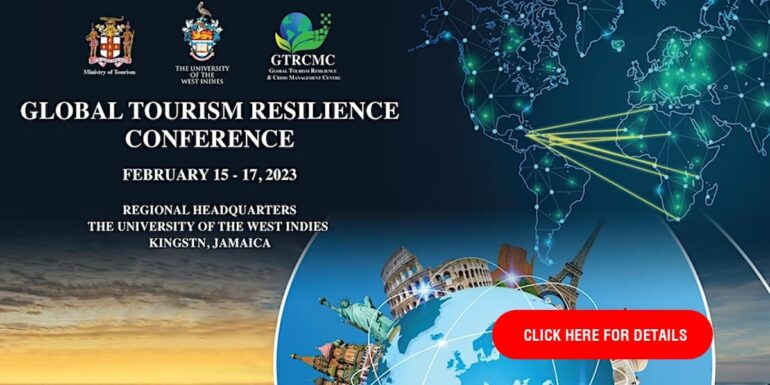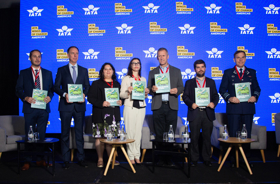by: Juergen T Steinmetz | copyright: eTurboNews – Travel Industry News – World Travel News
Agenda item 22 at the 77th session of the United Nations General Assembly in New York on Saturday dealt with the eradication of poverty and other development issues.
Making Global Tourism Resilience Day official today may convince Professor Lloyd Waller, in charge of the Global Tourism Resilience and Crisis Management Center in Jamaica, to open a bottle of Don Perignon for delegates that will attend the upcoming forum at the headquarters at the University of the West Indies in Kingston.
Initially brought forward by Bahamas, Belize, Botswana, Cabo Verde, Cambodia, Croatia, Cuba, Cyprus, Dominican Republic, Georgia, Greece, Guyana, Jamaica, Jordan, Kenya, Malta, Namibia, Portugal, Saudi Arabia, Spain, and Zambia, this UN resolution adopted in New York today was an achievement and in the making for 2 years by the global travel and tourism community.
The Hon. Edmund Bartlett, Minister of Tourism for Jamaica, brought this issue to the forefront by establishing the Global Tourism Resilience and Crisis Management Centre in Jamaica. Initially, the center was to deal with climate-related issues. When COVID became the number one tourism crisis in the world, Bartlett mobilized ministers and leaders from around the world.
Among those that supported Minister Bartlett in this process over the years were former UNWTO Secretary Dr. Taleb Rifai; the former Secretary of Tourism and Wildlife from Kenya, Najib Balala; and the influential Minister of Tourism, Ahmed bin Aqil al-Khateeb, from Saudi Arabia.
Hon. Edmund Bartlett (Jamaica) | HE Aqil al-Khateeb (Saudi Arabia) discussing Tourism Resilience in 2022.
Altogether, 94 countries cosponsored this resolution. This is a huge achievement not only for Jamaica’s Minister Bartlett but for the global travel and tourism community as well.
Global Tourism Resilience Day adopted
The General Assembly:
Reaffirming its resolution 70/1 of 25 September 2015, entitled “Transforming our world: the 2030 Agenda for Sustainable Development”, in which it adopted a comprehensive, far-reaching, and people-centered set of universal and transformative Sustainable Development Goals and targets, its commitment to working tirelessly for the full implementation of the Agenda by 2030, its recognition that eradicating poverty in all its forms and dimensions, including extreme poverty, is the greatest global challenge and an indispensable requirement for sustainable development, its commitment to achieving sustainable development in its three dimensions – economic, social and environmental – in a balanced and integrated manner, and to building upon the achievements of the Millennium Development Goals and seeking to address their unfinished business,
Reaffirming also its resolutions 53/199 of 15 December 1998 and 61/185 of 20 December 2006 on the proclamation of international years, and Economic and Social Council resolution 1980/67 of 25 July 1980 on international years and anniversaries, in particular paragraphs 1 to 10 of the annex thereto on the agreed criteria for the proclamation of international years, as well as paragraphs 13 and 14, in which it is stated that an international year should not be proclaimed before the basic arrangements for its organization and financing have been made,
Recalling the outcome document of the United Nations Conference on Sustainable Development, decision XII/11 of 17 October 2014 of the Conference of the Parties to the Convention on Biological Diversity on biodiversity and tourism development,
the outcome document of the third International Conference on Small Island Developing States, entitled “SIDS Accelerated Modalities of Action (SAMOA) Pathway”
the outcome document of the second United Nations Conference on Landlocked Developing Countries, the Vienna Programme of Action for Landlocked Developing Countries for the Decade 2014–2024,4 and the proclamation of the United Nations Decade on Ecosystems Restoration 2021–2030,
the declaration of the 2022 United Nations Ocean Conference to Support the Implementation of Sustainable Development Goal 14:
Conserve and sustainably use the oceans, seas, and marine resources for sustainable development entitled “Our ocean, our future, our responsibility”
and the United Nations Decade of Ocean Science for Sustainable Development 2021–2030,
Recalling also its resolution 77/178 of 14 December 2022 on the promotion of sustainable and resilient tourism, including ecotourism, for poverty eradication and environmental protection
Recognizing that tourism is a cross-cutting industry that contributes to the three dimensions of sustainable development and the achievement of the Sustainable Development Goals, including fostering economic growth, alleviating poverty, creating full and productive employment and decent work for all, accelerating the change to more sustainable consumption and production patterns and promoting the sustainable use of oceans, seas, and marine resources, promoting local culture, improving the quality of life and the economic empowerment of women, young people, and Indigenous peoples and promoting rural development and better living conditions for rural populations and local communities,
Recognizing also that the use of sustainable and resilient tourism, as a tool to foster sustained and inclusive economic growth, social development, and financial inclusion, enables the formalization of the informal sector, the promotion of domestic resource mobilization and environmental protection, and the eradication of poverty and hunger, including the conservation and sustainable use of biodiversity and natural resources and the promotion of investment and entrepreneurship in sustainable tourism
Acknowledging that tourism is among the economic sectors hardest hit by the coronavirus disease (COVID-19) pandemic, noting that the COVID-19 pandemic cut tourism direct gross domestic product by more than half in 2020, reducing it by 2.0 trillion United States dollars, with a cumulative loss for 2020 and 2021 of 3.6 trillion dollars in tourism direct gross domestic product, representing approximately 70 percent of the overall decline in world gross domestic product in 2020 compared with pre-pandemic values, noting also that the number of international tourist arrivals declined by 84 percent between March and December 2020 compared with the previous year, leading to unprecedented direct losses on foreign currency earnings, gross domestic product, and jobs,
Recalling the high-level thematic debate on tourism, on the theme “Putting sustainable and resilient tourism at the heart of an inclusive recovery”, convened by the President of the General Assembly in New York in May 2022, in collaboration with the World Tourism Organization, as an important milestone in working towards a concerted approach to tourism at the highest level within the United Nations system,
Emphasizing the need to foster resilient tourism development to deal with shocks, taking into account the vulnerability of the tourism sector to emergencies, and for Member States to develop national strategies for rehabilitation after disruptions, including through private-public cooperation and the diversification of activities and products
1. Welcomes the report of the Secretary-General of the World Tourism Organization, transmitted by the Secretary-General of the United Nations, on the promotion of sustainable tourism, including ecotourism, for poverty eradication and environment protection,
2. Decides to proclaim 17 February as Global Tourism Resilience Day, to be observed annually;
3. Invites all Member States, organizations and entities of the United Nations system, other international and regional organizations, civil society organizations, including non-governmental organizations, as well as academic institutions, the private sector, individuals, and other relevant stakeholders to observe Global Tourism Resilience Day, in an appropriate manner and in accordance with global, regional and national priorities, including through education and activities aimed at raising awareness of the importance of sustainable tourism;
4. Encourages the holding of further high-level thematic events on tourism, to be convened, as in 2022, by the President of the General Assembly in cooperation with the World Tourism Organization, as a regular platform for consultation within the United Nations system on tourism, in order to build on the work already begun, with a view to advancing towards a concerted approach on tourism at the highest level and maximizing its contribution to the sustainability agenda;
5. Stresses that the costs of all the activities that may arise from the implementation of the present resolution should be met through voluntary contributions, including from the private sector;
6. Requests the Secretary-General to bring the present resolution to the attention of all Member States, the organizations of the United Nations system, and other relevant stakeholders, including intergovernmental and non-governmental organizations, to promote the observance of the Global Day.
UN makes Global Tourism Resilience Day official“>Click here to read the FULL Article.
More news on eTurboNews – Travel Industry News – World Travel News

















































